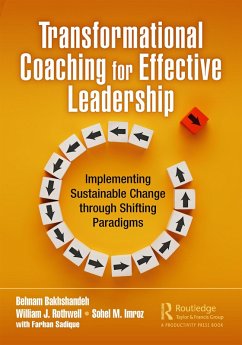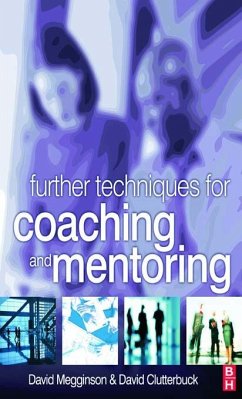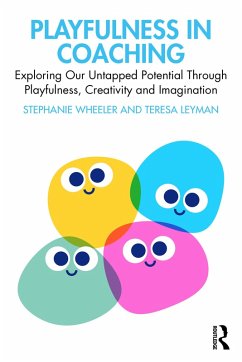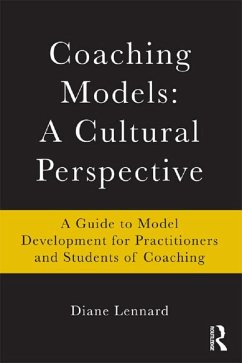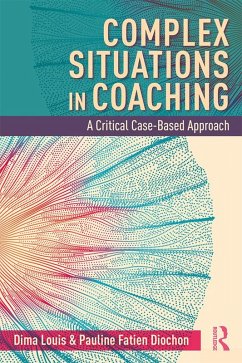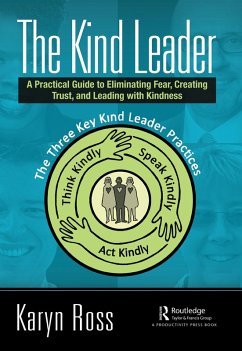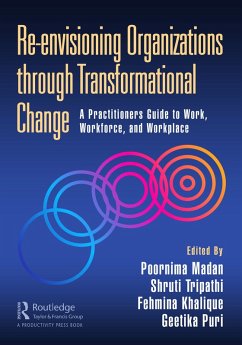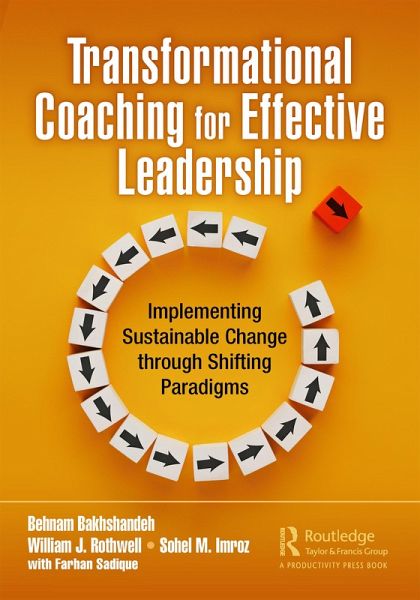
Transformational Coaching for Effective Leadership (eBook, ePUB)
Implementing Sustainable Change through Shifting Paradigms
Versandkostenfrei!
Sofort per Download lieferbar
41,95 €
inkl. MwSt.
Weitere Ausgaben:

PAYBACK Punkte
21 °P sammeln!
The purpose of this book is to introduce the concept of transformational coaching and to educate professional business coaches or mangers-as-coaches in their organizations on the influential and relevant elements of Transformational Coaching for Effective Leadership designed for coaching individuals, teams, and businesses or applying such elements in any level of organization development intervention, either toward individuals, teams, groups, departments, or the organization itself.Given the power and long-lasting influence of transformational coaching, it also could be beneficial to professio...
The purpose of this book is to introduce the concept of transformational coaching and to educate professional business coaches or mangers-as-coaches in their organizations on the influential and relevant elements of Transformational Coaching for Effective Leadership designed for coaching individuals, teams, and businesses or applying such elements in any level of organization development intervention, either toward individuals, teams, groups, departments, or the organization itself.
Given the power and long-lasting influence of transformational coaching, it also could be beneficial to professionals in the fields of human resource development (HRD), workplace learning and performance (WLP), human performance enhancement (HPE), and, overall, in the domain of workforce education and development (WFED).
This book will start by reviewing the background and presence of transformational coaching in businesses and organizations, along with the general concepts, perceptions, and understanding of coaching. _ is book will examine the uses of transformational coaching in management and leadership development, human resource development for talent development and retention, and for developing managerial coaching skills and competencies. Additionally, this book will review the presence and use of transformational coaching concepts, theories, and practices, including transformational learning for human resources (HR) and HRD professionals to influence a workforce's attitude, behavior, and productivity.
Features
Given the power and long-lasting influence of transformational coaching, it also could be beneficial to professionals in the fields of human resource development (HRD), workplace learning and performance (WLP), human performance enhancement (HPE), and, overall, in the domain of workforce education and development (WFED).
This book will start by reviewing the background and presence of transformational coaching in businesses and organizations, along with the general concepts, perceptions, and understanding of coaching. _ is book will examine the uses of transformational coaching in management and leadership development, human resource development for talent development and retention, and for developing managerial coaching skills and competencies. Additionally, this book will review the presence and use of transformational coaching concepts, theories, and practices, including transformational learning for human resources (HR) and HRD professionals to influence a workforce's attitude, behavior, and productivity.
Features
- Builds individuals' self-awareness, self-realization, and self-confidence
- Offers personal and professional development
- Teaches the concept of transformational learning and its use in transformational coaching
- Teaches rituals, skills, and strategies for individuals and teams to increase their productivity
- Offers an approach to building healthy and strong relationships with oneself and others
- Includes change management strategies for redirecting poor job performance
- Helps readers implement effective transformational coaching practices by offering many tools, such as forms, checklists, and worksheets
Dieser Download kann aus rechtlichen Gründen nur mit Rechnungsadresse in A, B, BG, CY, CZ, D, DK, EW, E, FIN, F, GR, HR, H, IRL, I, LT, L, LR, M, NL, PL, P, R, S, SLO, SK ausgeliefert werden.




